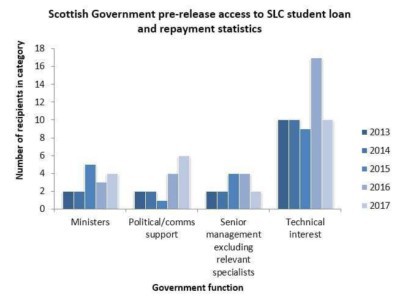It is not often possible to quantify how far a subject has increased in political sensitivity over time. Student debt in Scotland turns out to be a rare exception. How far sensitivity has increased, and why, provides a window on the state of public debate about higher education in Scotland.
First, the gratifyingly wonkish evidence. Every June, the Student Loans Company provides the latest data on student borrowing and repayments for each UK nation. Since 2013, it has also published the list of people given “pre-release access” to these statistics. In 2013, those in the Scottish Government given sight in advance were the Cabinet Secretary for Education and a junior minister, a couple of particularly senior civil servants, one special adviser, one person from the communications team, and ten people who might be broadly described as having a technical interest, because they worked directly on higher education policy, or were statisticians or economists.
By 2017, something had changed: the First Minister had joined the list, which now included four ministers. They were accompanied by two special advisers, two members of the communications team and two people described as “FMQ Team” (FMQs being First Minister’s Questions). As in 2013, there were also two particularly senior civil servants and ten broadly technical posts on the list.

There is a clear trend to a greater political and communications presence on the list over the period, though the change is not linear. The First Minister and Deputy First Minister first appear in 2015. The roles of Deputy First Minister and Cabinet Secretary for Education were combined in 2016: whether the DFM would have stayed on the list if that had not happened, is unknowable. The special adviser was missed out in 2015. For a couple of years, some extra senior civil servants without direct responsibility for higher education were included. In 2016 only, far more of the higher education policy team wanted a copy.
The long-term pattern is obvious, even so. Political and communications interest more than doubled. These roles made up one-quarter of recipients in 2013: they were closer to half four years later, and the FM’s office was a far more present presence.
What happened?
The explanation for this shift lies first in a large growth in student borrowing from 2013-14. That year the Scottish government cut means-tested grants so hard that the average payment under the Young Student Bursary fell by more than half.
It used loans to fill that gap and then to provide a little further support for those at lower incomes who were willing to borrow (far from all, in practice), while hugely increasing the minimum non-means-tested loan. The full, universal subsidy for tuition fees meanwhile remained insulated from any cuts. Debt for fees remained unthinkable.
The government’s initial announcement was woefully opaque, talking only about increased “support” and failing to mention grant cuts at all. But once the detail slipped out, it became clear that lending was expected to grow sharply and that the poorest were now expected to borrow most. It was a potentially awkward situation for an administration which had entered government promising to “dump the debt”, and criticised other parties for back-tracking on promises over student finance.
Yet the debate about rising debt for living costs and its distribution was slow to take off.
Opposition parties’ complaints began early but for a long time struggled to command attention. Journalists later told me that it had been hard to run critical pieces because NUS Scotland had agreed on the package with the Scottish Government. I think that in 2012 the NUS here was too careless about impacts on its low-income members, but that’s another story.
Making policymakers pay attention
What drove increased political interest was growing public scrutiny of its effects. Critical analysis emerged from a source that was neither the political parties nor (obviously) NUS Scotland. Someone employed by no-one stumbled across these changes, did the sums about their impact, and then sought attention for the questions she – I – felt they raised. My hourly rate (mainly zero, although I now have funding for a full-time PhD) has been awful. But I have stuck with it because it seems to me indefensible that students from lower incomes are taking on more debt for living costs, or else taking a cut in their support, in effect to spare those at higher incomes any debt at all for fees (which often in practice means any debt at all).
I provided evidence and arguments, others reacted, and the media finally had something to report, and did so, as more and more numbers emerged. Those growing SLC pre-release access lists to me are evidence that if you argue your case hard and long enough, and back it up, government can at least be made to sit up.
University leaders understand, no doubt that the Scottish Government could rearrange its cash subsidy for higher education, so that more, rather than less, goes into targeted living cost help and less into fee support. They also understand that the current system has led to a tighter cap on places in Scotland and a drop in acceptance rates for Scottish 18-year-olds because the full fee subsidy makes expansion hard to fund. They are also concerned about their general funding: we know this because they have recently begun to say so in public.
But university leaders are barely audible, attributably or unattributably, in the broader debate about the impact in Scotland of putting free tuition ahead of everything else. The only one I can think of has publicly criticised the policy: his remains an isolated voice. I am not the only person to notice this.
It is, quite bluntly, absurd that I am currently number thirty-nine on Wonkhe’s UK HE Power List largely for “stand[ing] almost alone as a dissenting voice in policy north of the border”. In the entry for the only other Scot (in a less absurd sixth place), the site argues that “the Scottish sector …. still remains firmly at the beck and call of government due to free tuition and recent reforms to universities’ governance”. Wonkhe’s analysis is echoed by others. A journalist here recently told me that senior university people in Scotland have criticised the current arrangements for funding universities to him in private as unsustainable, but are “too terrified” to say this in public.
Historic criticism
It wasn’t always this way. In the early part of this century, Scottish universities were loudly critical of their funding situation, as English universities saw their income rise through fees. I was Head of Higher Education in the then Scottish Executive at the time. It wasn’t that opening the papers was painful: we didn’t need to open them, because the criticism was usually in large letters on the front page.
The reluctance now among the senior ranks of Scottish higher education to share their misgivings about the way things are reflects badly on everyone involved, in universities and government. Public policy needs public debate: what sort of university culture recoils from contributing its views to that? What sort of government makes that such a terrifying prospect? Senior figures in the sector apparently feel less able to draw attention to their concerns about current policy than I do. Me, with my rickety funding position (there’s no secret source of family wealth, my partner is no high earner, we are still hands-on parents, and when my grant runs out in two years’ time, my pension will still be some way off).
Nor are the risks for someone like me just financial. Twice I have written to a parliamentary committee¸ to correct statements made about me by a minister in public. My PhD depends on access to government-held data: to the Scottish Government’s credit, this is now agreed, but it was a long, nerve-wracking wait, and it won’t feel completely over until the numbers are in my hands.
The signs are that the wrong people are being made to pay for current higher education policy in Scotland, in skewed debt or lost support, restricted opportunities and squeezed funding overall. As far as I can recall, no-one in Scottish university senior management has ever argued with me about this in public, nor got in touch to tell me privately that they disagree.
Perhaps our university leaders are terrified of me, but it seems likelier they are terrified of something else. If so, it’s surely time they considered how it reflects on Scotland’s universities that a serially grumpy postgraduate student who likes numbers has this year ended up as fully half of Scotland’s entry in the Wonkhe Power List, just for giving public voice to what many people in positions of real power appear to be thinking.













